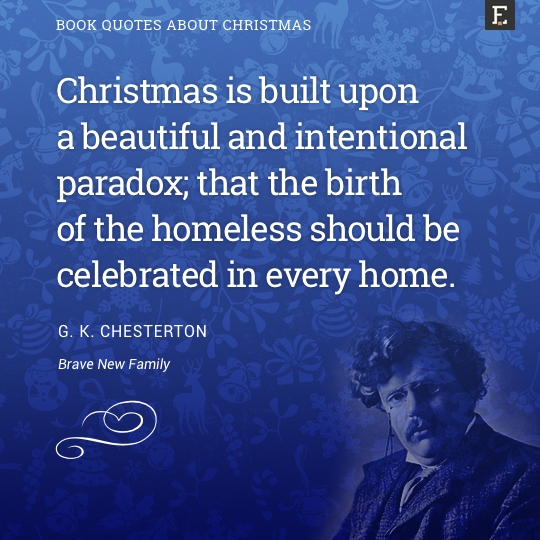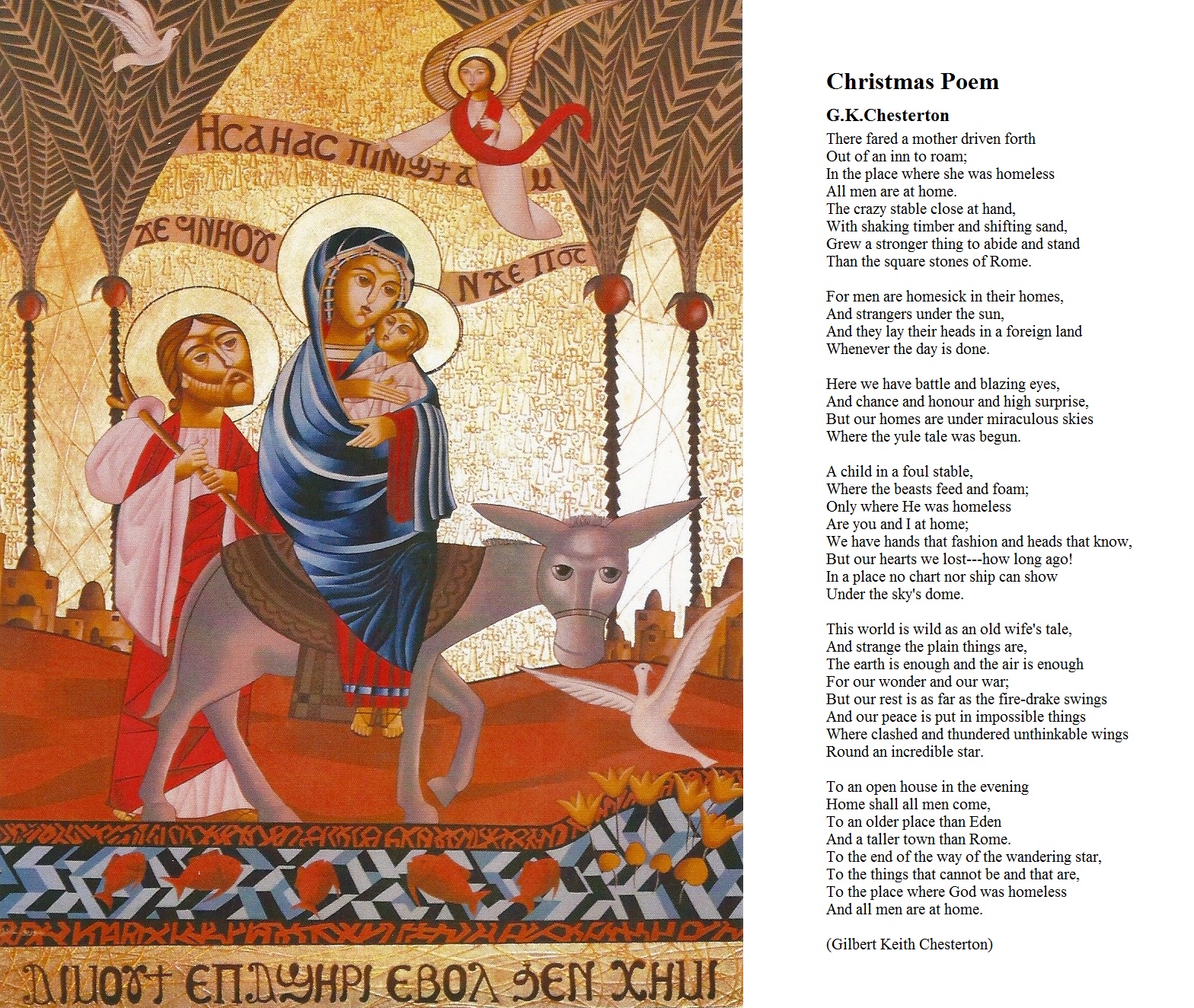Wishing you a very happy Christmas
G.K.Chesterton on Christmas:
“Christmas is built upon a beautiful and intentional paradox; that the birth of the homeless should be celebrated in every home…..but “The great majority of people will go on observing forms that cannot be explained; they will keep Christmas Day with Christmas gifts and Christmas benedictions; they will continue to do it; and someday suddenly wake up and discover why.”
The House of Christmas
“There fared a mother driven forth
Out of an inn to roam;
In the place where she was homeless
All men are at home….
A Child in a foul stable,
Where the beasts feed and foam;
Only where He was homeless
Are you and I at home….. To the place where God was homeless
And all men are at home.”
Full text at:
| The poem below, Noel, is by J.R.R. Tolkien, author of Lord of the Rings. Tolkien celebrates the triumph of Mary in a moment of darkness. |
| Noel J.R.R. Tolkien Grim was the world and grey last night: The moon and stars were fled, The hall was dark without song or light, The fires were fallen dead. The wind in the trees was like to the sea, And over the mountains’ teeth It whistled bitter-cold and free, As a sword leapt from its sheath. The lord of snows upreared his head; His mantle long and pale Upon the bitter blast was spread And hung o’er hill and dale. The world was blind, the boughs were bent, All ways and paths were wild: Then the veil of cloud apart was rent, And here was born a Child. The ancient dome of heaven sheer Was pricked with distant light; A star came shining white and clear Alone above the night. In the dale of dark in that hour of birth One voice on a sudden sang: Then all the bells in Heaven and Earth Together at midnight rang. Mary sang in this world below: They heard her song arise O’er mist and over mountain snow To the walls of Paradise, And the tongue of many bells was stirred in Heaven’s towers to ring When the voice of mortal maid was heard, That was mother of Heaven’s King. Glad is the world and fair this night With stars about its head, And the hall is filled with laughter and light, And fires are burning red. The bells of Paradise now ring With bells of Christendom, And Gloria, Gloria we will sing That God on earth is come. |
| J.R.R. Tolkien wrote ‘Noel’ when he was Professor of Anglo-Saxon at the University of Oxford. It was published in the 1936 Annual of Our Lady’s School, Abingdon, Oxfordshire, and remained largely unknown for decades. It was rediscovered in the school archives in 2013 and came to the attention of the media in 2016. ‘Noel’ is a retelling of the Christmas story from the perspective of the Blessed Virgin. The grey winter opening scene gives way to Mary’s singing and the triumphant ringing of Heaven’s bells at Christ’s birth. |
.
Chesterton on Christmas.
In “All Things Considered” Chesterton wrote “What life and death may be to a turkey is not my business; but the soul of Scrooge and the body of Cratchit are my business”.
Elsewhere he said that “The great majority of people will go on observing forms that cannot be explained; they will keep Christmas Day with Christmas gifts and Christmas benedictions; they will continue to do it; and some-day suddenly wake up and discover why.”
Chesterton’s insistence that we mustn’t be half hearted in our celebrations strongly contrasted with the prohibitions of Oliver Cromwell and the Puritans.
The seventeenth century Puritan-dominated Parliament said Christmas was “a popish festival” with no biblical justification and replaced it with a day of fasting – and it took King Charles II, in 1660, to restore the festivities. Poor Robin’s Almanack celebrated the restoration: “Now thanks to God for Charles return; Whose absence made old Christmas mourn; For then we scarcely did it know; Whether it Christmas were or no”.
But the Puritans were mild compared with what followed.
The atheistic French revolutionaries banned Christian Christmas services and in a foreshadowing of some of our politically correct twenty-first century ideologies the three kings cake had to be renamed “the equality cake.”
By the twentieth century their atheistic Soviet heirs had outlawed Christmas celebrations – encouraging school children to spit on crucifixes – while Joseph Perry ( “How the Nazis co-opted Christmas: A history of propaganda”) says “because Nazi ideologues saw organized religion as an enemy of the totalitarian state, propagandists sought to deemphasize—or eliminate altogether—the Christian aspects of the holiday” and, consequently “propagandists tirelessly promoted numerous Nazified Christmas songs, which replaced Christian themes with the regime’s racial ideologies.”
In England, in our own times, Christmas-deniers have tried to rebrand the festival by calling it Wintermas, or some such, and wishing visitors or customers “Happy Holidays” – anything but Christmas.
The contemporary festivities that many of us will enjoy had their origins in the reign of Queen Victoria – inspired by the writings of Charles Dickens. Chesterton argued that Dickens saved Christmas for England.
He also insisted that beyond the raised glass and the fatted bird, there is a literally an earth-shattering story that must be told.
I particularly like his paradoxical call to give “Glory to God in His Lowest”and his description of “ the hands that had made the sun and stars were too small to reach the huge heads of the cattle.”
And the Word became flesh and dwelt among us.
I often think of the children’s picture book where the mythical Santa Claus is reading to the real baby Jesus the story of the baby’s own birth. “And how does it all end?” the baby asks.
We know that it doesn’t end in the stable or with the visit of the Magi; and we know that even within days of His birth, the life of Jesus is threatened by Herod and his butchers, sharpening and their knives even as the Son of God is being born.
In “The God In The Cave” Chesterton, points to the way evil is always waiting in the wings with a particular “detestation of innocence”:
“There was” said Chesterton “present in the primary scenes of the drama that Enemy that had rotted the legends with lust and frozen the theories into atheism, but which answered the direct challenge with something of that more direct method which we have seen in the conscious cult of the demons.”
Of Herod, he “seems in that hour to have felt stirring within him the spirit of strange things… Everyone knows the story; but not everyone has perhaps noted its place in the story of the strange religions of men… a seer might perhaps have seen something like a great grey ghost that looked over his shoulder…The demons in that first festival of Christmas, feasted also in their own fashion.”
And those demons continue to feast, in their own fashion, today.
I cannot reflect on the slaughter of the Holy Innocents, brilliantly commemorated in the carol, “In Rama There Was a Voice Heard” without thinking of the nearly nine million of our babies whose lives have been ended in their mother’s wombs.
In the words of the sixteenth century Coventry Carol, written by Robert Croo, in 1534, for the traditional Coventry Plays:
“Herod, the king, in his raging,
Charged he hath this day
His men of might, in his own sight,
All young children to slay.”
This lament of a mother for her child who is doomed to die might have been written for a country in which one child in the womb loses its life every three minutes of every hour of every day.
This terrible loss of life is a great evil. In Britain like Rama there is nothing sentimental about the Christmas story and there must be a moment when we reflect on the brutal, violent world we have created.
“Then woe is me, poor Child, for Thee,
And ever mourn and say;
For Thy parting, nor say nor sing,
By, by, lullay, lullay.”
But we also know that in Bethlehem and at Calvary that although evil has its day, it does not triumph.
It’s why, this Christmas, we can joyfully rejoice with Chesterton’s Wise Men
“Hark! Laughter like a lion wakes
To roar to the resounding plain,
And the whole heaven shouts and shakes,
For God Himself is born again,
And we are little children walking
Through the snow and rain”.
And we can join with Chesterton in hoping and praying that our nation will “someday suddenly wake up and discover why” we are celebrating Christmas. And why we’re not doing it in a half hearted manner.

“Christmas is built upon a beautiful and intentional paradox; that the birth of the homeless should be celebrated in every home….The great majority of people will go on observing forms that cannot be explained; they will keep Christmas Day with Christmas gifts and Christmas benedictions; they will continue to do it; and some day suddenly wake up and discover why.” – G.K.Chesterton




